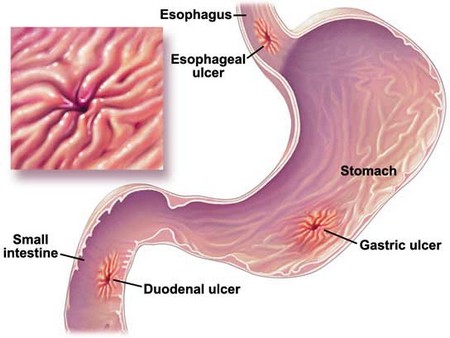Children often suffer from ulcers, although girls tend to be more susceptible than boys. They’re also more likely to occur if other members of the family have them. The most common type are aphthous ulcers, which occur singly or in clusters on the tongue, gums, inner lips or cheek and can be caused by stress, allergies, or sensitivities. They are small, roundish and look grey, yellow or white with an inflamed edge. Other types of ulcers occur as a result of an injury, such as biting the soft mucous membrane of the tongue or inside of the cheek, or when a toothbrush fibre has pierced the gum. Some blisters that look like ulcers may be cold sores or thrush. Ulcers will heal on their own, but this can take up to a couple of weeks and can be very uncomfortable for the child.
What you can do
If your child seems to have difficulty in eating or has lost their appetite due to discomfort or complains of a sore mouth, check for ulcers. If your child suffers from recurrent ulcers, check with your doctor for any underlying cause. Give your child easy-to-eat foods, such as yoghurt, and steer clear of salty or spicy foods as these can aggravate the condition.
Treatment
Naturopathy
Stress factors can cause an imbalance in the metabolism, according to naturopaths, and so increase acidity, leading to mouth ulcers. To combat this, a low fruit, high vegetable diet should be recommended, as fruit is high in acidity. To help boost the immune system, supplements such as zinc, vitamin A as beta carotene, vitamins C in an alkaline form and E may be given. Plenty of rest is advised, water to help detoxify and the child should avoid sharp foods such as crisps.
Herbal medicine
Hops have long been used for ulcers for their antiseptic qualities. A herbalist may also recommend using parts of the Ginkgo Biloba tree, which works as an astringent and stimulant. Giving a liquorice stick to chew may also be a pleasant way to help speed up the healing process. However, too much can have a laxative effect. A mouthwash using an infusion of Sage or Thyme may also be given, but only if the child is old enough not to swallow it.
Aromatherapy
If your child is old enough to use a mouthwash without swallowing, a therapist may recommend rinsing with water containing an essential oil such as Tea-Tree to help speed up the healing of the ulcers. Tea-Tree oil has known antiseptic qualities and can also help to stimulate the immune system, as ulcers often set in when this is low. A couple of drops well mixed in a cup of cooled boiled water should help. Other oils that may aid healing are Lemon, Geranium and Thyme.
Kinesiology
A practitioner will look at the possible causes of the immune system becoming weak and at ways of supporting it. They may also advise a diet that is high in the vitamin B complex and vitamin E, and that salty and sweet foods are avoided while the ulcers remain.
